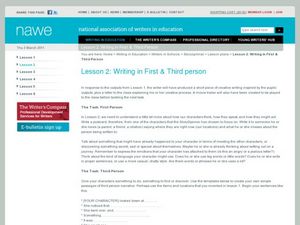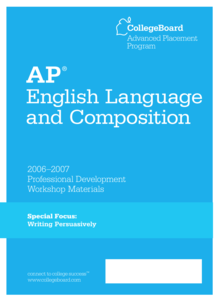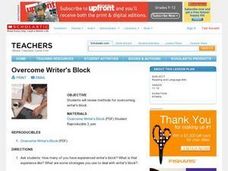Curated OER
Nonfiction Genre Mini-Unit: Persuasive Writing
Should primary graders have their own computers? Should animals be kept in captivity? Young writers learn how to develop and support a claim in this short unit on persuasive writing.
Curated OER
Personal Narrative Paragraphs: Class Quilt
Begin this activity by asking third graders to bring from home pieces of cloth that represent something important to them. (Have extras for students who need them.) They reflect on important events in their lives, compose narrative...
Curated OER
How do I write a friendly letter?
Teach your class the basic format of a friendly letter. Pupils learn about the heading, greeting, body, closing, and signature. There is a brief quiz at the end to check for understanding. The links for this section work correctly and...
Curated OER
Writing in First and Third Person
Explore narrative writing by participating in a role-playing activity. In this perspective lesson, learners define first and third person in writing and discuss how it changes the mood of the reader. The first activity has pupils write...
College Board
AP® English Language and Composition Special Focus: Writing Persuasively
It's not always easy to persuade others. However, it may even be harder to teach others how to be persuasive. Educators get personal insight from Brent Staples, an influential commentator, as well as gain ideas and activities on teaching...
Visa
Money Matters: Why It Pays to Be Financially Responsible
What does it mean to be financially responsible? Pupils begin to develop the building blocks of strong financial decision making by reviewing how their past purchases are examples of cost comparing, cost-benefit analysis, and budgeting.
Curated OER
Poetry Introduction: Reading Strategy and Response
Fifth graders analyze a poem. In this poetry analysis lesson students read a poem, analyze it, and write a response. They write about their own thoughts on the poem's meaning and any feelings they have about the poem.
Brigham Young University
The True Confessions of Charlotte Doyle: Biopoem
Conclude your novel study of The True Confessions of Charlotte Doyle by Avi with this biopoem activity. Get an in-depth look into the personal interests of the poem's subject including feelings, needs, fears, and more!
Scholastic
Writing to a Historical Poet
Poetry is a very personal and introspective art form. Give your class the opportunity to understand how a poet's voice can speak to them on a personal level, and that every reader can respond to an author differently. After a poetic...
Curated OER
"The Charge of the Light Brigade": Writing Prompt and Pre-writing
Inspire your learners to experience poetry in an entirely different way with this resource. A writing prompt that goes along with "The Charge of the Light Brigade" by Alfred Lord Tennyson, learners craft a reflective piece in the voice...
Missouri Department of Elementary
Put Yourself in Check
The final lesson in a four-part unit on conflict resolution offers middle schoolers strategies for how to keep themselves in check when involved in conflicts. A role-play activity and a reflective journal stress the importance of...
Curated OER
Writing Exercises: Science and Technology II
All revolutions in science and technology have both pros and cons. Kids examine the advent of the green revolution, nuclear growth, use, and the countries that are considered nuclear powers. They'll construct three responses to each of...
Curated OER
Descriptive Writing: Using Art to Inspire description
Write with the senses! Try using art to inspire writers to consider all of the senses. Here, the class is divided in half. Each group looks at one of two images, imagines the senses that would be engaged, and records answers to five...
Mama's Heels
First Day Interview
The first day of school can be a bit scary when so many new faces are around. Help kids get to know one another through an interview sheet that highlights personal information, things that excite them, their favorites, and future hopes...
New Brunswick Department of Education
Personal Development And Career Planning Curriculum Grade 9/10
What is the difference between a proactive person and a reactive person? Scholars explore the topic, and many others, with helpful lessons, discussions, role play activities, and games. Each activity supports one of the key principles...
Overcoming Obstacles
Playing by the Rules
The takeaway from the "Playing by the Rules" instructional activity is that it is each person's responsibility to learn the rules in a given situation and that they must accept the consequences if they choose not to follow the stated...
Character Kids
The Fourth and Fifth Rs - Respect and Responsibility
Set the tone for a successful school year with a list of strategies to instill respect and responsibility. With tips for classroom management and ways to get parents involved, the resource is valuable for new and veteran teachers alike.
Nancy Fetzer's Literacy Connections
Expository Paragraph
Upper elementary and middle school writers learn how to craft an expository paragraph by following the six steps detailed in a 48-page instructional guide. Learners learn how to write six different types of informational paragraphs: to...
Curated OER
7 Habits of Highly Effective Teens
How many good habits does it take to be a successful adolescent? According to The 7 Habits of Highly Effective Teens by Sean Covey, just seven! Using the worksheets, learners answer personal growth questions and develop strategies for...
College Board
2004 AP® English Language and Composition Free-Response Questions
Shall we agree to disagree? Scholars have the opportunity to choose a topic they feel is controversial in the world and express ideas about it. They complete essays that address the opposite views. In two other essays, they analyze a...
Curated OER
Borrowing Narrative Skills from Mr. Fletcher: Using a "Prompts in Reverse" Technique to Inspire Your Writers
Help your class find their writing voices with this lesson which uses the work of Ralph Fletcher to guide a "Prompt in Reverse" activity. Using the chapter "First Pen" from Fletcher's Marshfield Dreams, learners decipher what they...
Curated OER
Writing and Scholarship Planning For College-Bound Students: Overcome Writer's Block
Learners examine methods for overcoming writer's block. They complete a worksheet, write personal statements, and participate in a class discussion.
Prestwick House
The Sign of the Beaver Student Response Journal
Discuss the themes and events of Elizabeth George Speare's The Sign of the Beaver with a collection of journal topics. Each chapter contains two or three questions for kids to consider and write about, for a total of 24 questions.
College Board
2003 AP® English Language and Composition Free-Response Questions
How does perspective change a person's view? Scholars view different perspectives as they compare the styles of two different authors describing a flock of birds. Writers also create essays in response to entertainment ruining society...

























